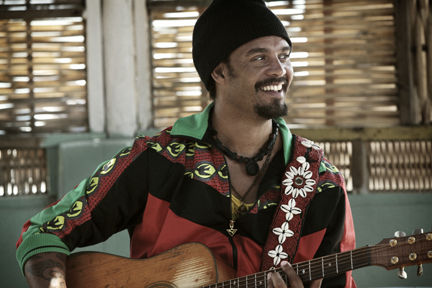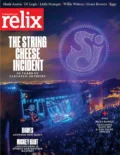
Photo by James Minchin
In the midst of a tour of Australia, Michael Franti and Spearhead have released an EP available on iTunes in the Live from SoHo series. The six-song work is especially notable in that it appears to capture the essence of the frontman’s consistent theme of positivity and community outreach through action, determination, and, most of all, hope. Franti is a busy man these days, as he always seems to be, contributing to the relief for Japan, post-earthquake and tsunami, working in Haiti, and elsewhere, with Soles4Souls, a charitable organization near to his heart (and feet, for that matter), and even helping out a San Francisco Giants’ fan’s family after a tragic beating in the Dodger Stadium parking lot put Brian Stow in a coma in the hospital, and with a mountain of medical bills. Franti is also busy with his day gig, continuing to find original ways to infuse magic into his music—both old and fresh new tracks—as Jambands.com caught up with the musician for a short chat while in the studio before he headed out to the land Down Under.
RR: Where did you get the idea to release Live from SoHo, the new EP?
MF: We were in New York and iTunes invited us to come in there [the SoHo Apple store in October 2010] to do a recording. It sounded so good that we said, “We should put this out as an EP.” It’s got the song on it “I’ll Be Waiting,” which is our new single that is on our last album [2010’s The Sound of Sunshine ], so we thought of putting the single out now, even though a lot of people have the album, to give them something else, a different version, a different twist on it.
RR: There’s a beautiful and moving video for “I’ll Be Waiting,” as well.
MF: That’s probably my favorite song on the album. Every time we play it live, I see people in the crowd put their arms around somebody that they love, or put their hands in the air. It’s this great anthemic song about friendship, and about love, and about connecting with someone that has sort of lost the path, or somebody who you are waiting to come home. I wanted to put all those things into the video. We had written about three or four different treatments. Some were in different countries, and some were all kinds of different locations, and then, I thought back to my audience: “I want to do a video about the people in my crowd.”
And so, we just thought about these different ideas. We thought about a soldier who is coming home from war who is missing a limb, and his family hasn’t seen him left. A kid who is riding a bike for the first time. Somebody who is dying and going on to the next life. Somebody who has lost their child. People who are just hanging out at the beach, and questioning their life and, at the same time, letting go, being free, and being young.
Originally, we shot this video in San Francisco. It really wasn’t having all the emotional punch that we wanted, so we went back and we shot all those little vignettes that are now in the video based upon my thoughts from seeing people in our audience. The first time we saw the edit of it, all of us cried, everybody in the room. (laughter) We were all looking around at each other. We’d heard the song a hundred times; how did this happen?
I feel really proud about that because I’ve made lots of music in my career that is socially-inspired and political, and I feel that that song and that video really sums up everything that I feel about why any of us should care about anything that is happening in the world. There’s so much that’s taking place. It’s hard to…you get caught up in it, and it’s easy to become cynical when you watch the news, just the sound bites themselves—tsunami, earthquake, Libya, no fly zone, civil war, climate change, economic crisis. At the same time, the most important things in our life are those people who are around us who we really care about the most, and that’s what we tried to show in the video.
RR: What I love about the new live EP is what I love about your work—there is a conceptual continuity that is filled with a positive spirit. For example, you’ll sing about how a so-called enemy is really a friend. You have a positive spin on all of the things you’ve just mentioned, and what we have endured in the past as a collective. How do you continue to be such a positive force in this global community?
MF: Well, I guess it comes from my childhood when I was a kid. My mom gave me up for adoption, and I was raised in a family that was Finnish American. My birth mother’s Irish, French and German; my birth father’s African American and Seminole Indian. So I grew up in this family of Finnish Americans, who had three kids of their own, and they adopted me and another African American, and I grew up in this melting pot of a family. My next door neighbor was Jewish, the kid across the street was Korean, the kid three houses down was Mexican, and so I grew up around a lot of different types of cultural experiences.
My mother, who raised me, was insistent that all five of us kids in the Franti family were treated exactly the same. She also insisted that when we went out into the world we treat other people the same way. And, at the same time I had this incredibly loving mom who was very tough, I also just didn’t feel like I fit in with my family. I felt loved and nurtured, but I also felt alone. Somewhere, there were my blood relatives that I never met, and so I grew up with this compassion for the underdog, and empathy with the underdog. That’s what I’m always trying to do with my songs—trying to find ways to speak up for people that feel lonely, who feel left out, who feel like they’re not cool enough, or pretty enough, or strong enough. That’s what my lyrics always speak to.


No Comments comments associated with this post